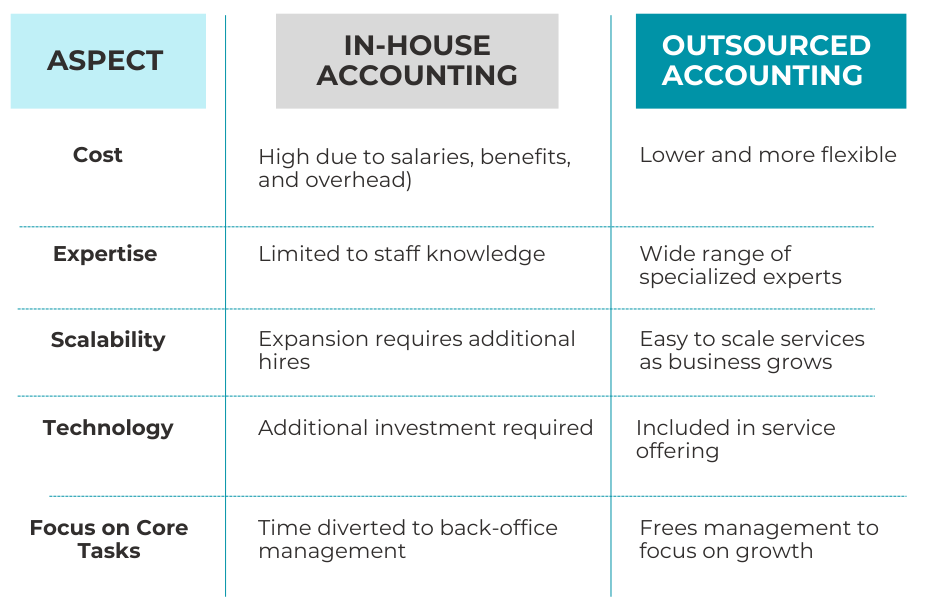
For every industry, efficiency, financial accuracy, and compliance are crucial for survival and long-term growth. Yet, many organizations ranging from small businesses to multinational companies struggle with the increasing complexities of accounting and financial management. Rising compliance requirements, evolving tax laws, and the need for timely and accurate financial reporting put pressure on internal teams. For many, building and sustaining an in-house accounting department is not the most practical choice. This is where outsourced accounting services provide a strategic advantage, offering businesses the opportunity to strengthen their financial management while keeping costs under control.
If you’re considering outsourcing your accounting and tax services, keep reading this guide to help you make a more informed decision.
What Are Outsourced Accounting Services?
Outsourced accounting services refer to the practice of hiring an external firm to handle your company’s accounting functions. These services can range from basic bookkeeping and payroll to complex financial reporting, tax compliance, and even CFO-level advisory. Instead of bearing the full expense of hiring, training, and retaining an in-house team, companies can rely on external experts who deliver specialized accounting and tax services using modern tools and secure systems.
According to a report by Grand View Research, the global accounting services market size was valued at USD 628.4 billion in 2022 and is expected to grow significantly, highlighting the increasing demand for outsourced solutions.
This growth demonstrates how organizations across industries see the value in delegating financial tasks to experts who can ensure compliance, improve efficiency, and support data-driven decision-making.
Why Businesses Outsource Their Accounting Functions
Companies choose to outsource their accounting and tax services for many reasons. Each reason highlights the challenges organizations face when handling accounting in-house and the advantages they gain by working with specialists.
Cost Savings
Building an internal accounting department requires significant financial investment. Salaries, benefits, software licenses, ongoing training, and infrastructure costs add up quickly. Outsourcing eliminates much of this burden. Businesses pay only for the specific services they need, allowing them to reduce overhead while still ensuring high-quality financial management.
Access to Expertise
The accounting landscape changes constantly, with new tax regulations, reporting standards, and compliance requirements introduced regularly. Outsourcing firms employ certified accountants and tax professionals who remain updated with these changes. This gives companies access to a broader knowledge base and minimizes the risk of errors that could lead to penalties or financial mismanagement.
Scalability
As businesses grow, their accounting needs become more complex. What starts as basic bookkeeping soon expands into tax planning, payroll management, and complex reporting. Outsourced accounting services are designed to scale, making it easy for companies to add services as they grow without the need for major restructuring or additional hires.
Focus on Core Business Functions
Business leaders and employees can only focus on so much at once. By offloading accounting and tax responsibilities to professionals, companies free up internal teams to focus on strategy, customer service, product development, and revenue generation. This shift ensures that time and resources are used where they have the most significant impact.
Technology and Automation
Modern accounting requires more than spreadsheets. Advanced tools and automation technologies simplify processes, reduce manual errors, and provide real-time financial data. Outsourced accounting firms already invest in these technologies, so businesses benefit without having to spend heavily on software or infrastructure.
Services Typically Offered in Outsourced Accounting
When businesses partner with an outsourced accounting firm, they gain access to a comprehensive suite of services tailored to their needs. These services go beyond traditional bookkeeping and encompass a wide range of functions essential to sound financial management.
Bookkeeping
Accurate record-keeping is the foundation of healthy financial operations. Outsourced providers handle everything from recording daily transactions to reconciling accounts and managing payables and receivables, ensuring a clear financial picture at all times.
Payroll Processing
Managing payroll is complex, involving salary computations, tax deductions, and compliance with labor laws. Outsourced payroll services ensure employees are paid correctly and on time while maintaining strict compliance with legal requirements.
Tax Preparation and Compliance
Tax laws differ by jurisdiction and are constantly changing. Outsourced accounting and tax services ensure accurate preparation and timely filing of taxes, helping companies avoid penalties while taking advantage of available deductions and incentives.
Financial Reporting
Business leaders need access to reliable financial data to make informed decisions. Outsourced providers generate monthly, quarterly, and annual financial reports that give a transparent view of performance, profitability, and cash flow.
Audit Support
Preparing for an audit requires meticulous attention to detail. Outsourced accountants help businesses organize financial records, maintain compliance, and work smoothly with auditors to ensure an efficient review process.
Virtual CFO Services
Not all businesses can afford a full-time Chief Financial Officer. Outsourced accounting firms often provide virtual CFO services, offering expert guidance on budgeting, forecasting, and financial strategy at a fraction of the cost.
Outsourced Accounting vs. In-House Accounting
Many business leaders wonder whether outsourced accounting is truly better than keeping an in-house team. Here’s a comparison:

Outsourced accounting gives companies the ability to reduce costs and gain specialized knowledge without sacrificing quality or control.
Key Benefits of Outsourced Accounting Services
When businesses transition to outsourced accounting services, they unlock a range of benefits that improve financial clarity, compliance, and long-term growth.
Improved Accuracy
Accounting mistakes can lead to serious consequences such as fines, penalties, or damaged credibility. Outsourced providers implement strict review processes and leverage modern accounting software to minimize errors and provide more reliable financial data.
Better Compliance
Tax regulations and reporting requirements are complex and constantly changing. Outsourcing firms offering accounting and tax services ensure that compliance is maintained, reducing the risk of missed deadlines or misfiled documents. This helps safeguard businesses from legal or financial penalties.
Increased Efficiency
Accounting tasks such as reconciliations, payroll, and reporting can consume hours of work. By outsourcing, companies shorten turnaround times, streamline processes, and benefit from efficiency gains brought by automation.
Strategic Insights
Access to accurate financial data in real time allows decision-makers to assess business performance quickly. Outsourced partners often go beyond reporting by offering valuable insights that support budgeting, forecasting, and strategic planning.
Data Security
Financial data is sensitive and must be protected. Reputable outsourced accounting firms invest in secure cloud platforms, encryption, and backup systems to safeguard client information against potential breaches.
Common Misconceptions About Outsourced Accounting
Despite its growing popularity, outsourcing accounting still comes with misconceptions that discourage some businesses from exploring it fully.
- “It’s only for large corporations.”
In reality, small and medium-sized businesses benefit the most from outsourcing because it allows them to access expertise affordably.
- “I’ll lose control of my finances.”
With modern platforms, clients have real-time access to their financial data. Transparency and collaboration remain central to outsourced accounting relationships.
- “It’s too expensive.”
Outsourcing is typically more cost-effective than managing an in-house department, particularly when factoring in salaries, benefits, and infrastructure.

How to Choose the Right Outsourced Accounting Partner
The effectiveness of outsourcing depends heavily on choosing the right provider. Businesses should evaluate potential partners carefully to ensure alignment with their needs. Consider the following:
1. Experience and Expertise
Industry-specific experience ensures the provider understands your unique accounting and compliance requirements. A firm with proven expertise in your sector can add immediate value.
2. Technology Stack
The best firms use modern accounting platforms such as QuickBooks, Xero, or NetSuite, ensuring clients can access reliable data anytime. Ask about the systems used and how they integrate with your current setup.
3. Data Security
With cyber risks on the rise, strong security protocols are non-negotiable. Providers should demonstrate compliance with data protection standards and outline their encryption, backup, and recovery measures.
4. Scalability
Choose a partner that can grow with you, offering additional services as needed.
5. Transparency and Communication
Regular updates and access to data should be standard.
Best Practices for Transitioning to Outsourced Accounting
Transitioning from an in-house accounting setup to an outsourced model requires careful planning. Without a structured approach, businesses risk disruptions or misalignments. By following best practices, companies can ensure a smoother transition and maximize the benefits of outsourcing.
Assess Your Current Accounting Needs
Start by evaluating your existing accounting processes. Identify which tasks are consuming the most time, creating bottlenecks, or exposing the business to compliance risks. This clarity helps in defining the scope of services required from an outsourced provider.
Choose the Right Partner
Not all outsourcing providers are equal. Businesses should conduct thorough research, evaluate industry experience, and check references. A partner with expertise in your specific sector can provide more relevant insights and faster results.
Set Clear Expectations
Clearly define deliverables, timelines, and performance metrics. Both parties should understand roles and responsibilities to prevent confusion and establish accountability.
Integrate Technology
Compatibility of accounting software is essential. Whether you use QuickBooks, Xero, or NetSuite, ensure your chosen provider can integrate seamlessly into your existing systems. This minimizes disruptions and ensures real-time visibility.
Maintain Regular Communication
Regular updates and review meetings help build trust and keep both parties aligned. Open communication ensures that the outsourced team becomes an extension of your internal operations rather than a distant vendor.
Challenges of Outsourcing Accounting (And How to Overcome Them)
While the advantages of outsourcing are clear, businesses must also acknowledge potential challenges and prepare strategies to address them.
- Data Security Risks – Financial data is highly sensitive. Companies should only work with providers that demonstrate strong encryption, compliance with global standards, and robust backup systems. Conducting periodic audits of security practices also adds an extra layer of protection.
- Time Zone Differences – Working with offshore providers may present scheduling challenges. This can be mitigated by establishing overlapping work hours and using communication tools such as Slack or Microsoft Teams to streamline collaboration.
- Integration Issues – Businesses often rely on multiple financial systems. Choosing providers who are adept at system integration reduces friction during onboarding and ensures data consistency.
- Change Resistance – Employees may initially resist outsourcing due to fears of redundancy or loss of control. Leadership should communicate the strategic benefits clearly, emphasizing that outsourcing supports the business by freeing internal teams for higher-value activities

Is Outsourced Accounting Right for Your Business?
Deciding whether to outsource depends on several factors including company size, financial complexity, and growth trajectory. Small and medium-sized businesses often see the greatest benefit, as outsourcing provides access to professional accounting and tax services at a fraction of the cost of maintaining an internal department. Larger organizations, meanwhile, can use outsourcing to enhance scalability, manage compliance across multiple jurisdictions, and optimize efficiency.
If your leadership team is spending too much time resolving bookkeeping issues, missing tax deadlines, or struggling with inconsistent financial reporting, it may be time to consider outsourcing. With the right provider, accounting shifts from a burden to a strategic advantage.
Conclusion
Outsourced accounting services represent far more than an operational convenience. They provide businesses with tools, expertise, and flexibility to manage finances strategically. By tapping into outsourced accounting and tax services, companies achieve improved compliance, enhanced accuracy, and reduced operational costs while gaining access to scalable solutions and advanced technologies.
The Philippines, with its skilled workforce and cost advantages, continues to be a leading destination for businesses worldwide seeking outsourced solutions. When paired with best practices in transition management and proactive communication, outsourcing becomes a powerful driver of growth and efficiency.
In an increasingly competitive marketplace, companies that embrace outsourced accounting stand better prepared for the future. It means building a reliable financial foundation that empowers business leaders to make informed, confident decisions that shape long-term success.
Ready to explore outsourced accounting services for your business? Guided Outsourcing provides customized solutions in accounting, IT, admin, and marketing that fit your exact needs. Connect with us today to learn how we can support your growth.

